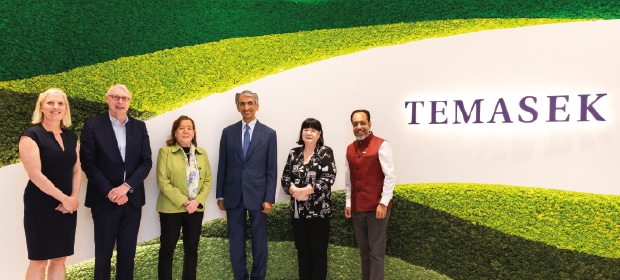Towards Net Zero, Nature Positive, and Inclusive Growth
Our sustainability strategy is core to our remit to build a resilient and forward-looking portfolio that not only generates sustainable returns over the long term, but also catalyses positive outcomes towards net zero, nature positive, and inclusive growth.
Sustainability has become a clear and urgent business imperative. Our success as an investor and institution hinges on thriving businesses and economies, cohesive societies and communities, a resilient planet, and the well-being of people. As an asset owner with a diverse portfolio spanning sectors and geographies, sustainability poses tangible risks to our investments and the returns we aim to generate and preserve. It also provides an opportunity to uplift value and invest in structural sustainability tailwinds.
As such, our sustainability strategy is focused on reducing negative impacts and advancing positive ones across three thematic areas of net zero, nature positive, and inclusive growth.
Net Zero
We are already witnessing the impact of climate change on economies, with US$2 trillion in costs over the past decade1. Extreme weather events are increasingly impacting companies’ productivity and profitability as a result of property damage and supply chain disruptions, as well as affecting access to and affordability of insurance. An orderly transition to a low-carbon future is not only necessary but could provide a 7% boost to global GDP by 20502. Building long-term sustainability requires us to address climate change and its long-term effects. We recognise this is a journey that must be balanced with maintaining a resilient business model and strong balance sheet. This approach ensures we have the necessary resources for a just transition. We aim to achieve net zero by 2050, and are taking active steps towards reducing our institutional and portfolio emissions, by investing in promising green solutions and brown to green transition opportunities, as well as engaging our portfolio companies to encourage the adoption of low-carbon strategies and practices. Our climate strategy is therefore integrated with our overall business strategy, allowing us to pursue climate goals while maintaining financial resilience.
1International Chamber of Commerce, The economic cost of extreme weather events (2024)
2 Network for Greening the Financial System, The green transition and the macroeconomy: a monetary policy perspective (2024)
Nature Positive
More than half of the world’s GDP — equivalent to about US$58 trillion — is moderately or highly dependent on nature1. We are at a tipping point with ecosystem degradation posing serious risks to the natural resources that underpin our economy and quality of life. Global initiatives such as the UN Kunming-Montreal Global Biodiversity Framework (GBF) and the Taskforce on Nature-related Financial Disclosures (TNFD) are rallying global actions to halt and reverse nature loss.
We are doing our part by embarking on a Nature Roadmap to stay front-footed in understanding the dependencies and impacts of our business and portfolio so we can more effectively manage the risks and capture the opportunities that come from adopting nature positive business models and practices.
1PwC, Managing nature risks: From understanding to action (2023)
Inclusive Growth
Economic progress should benefit everyone, not just a select few. Rising social inequality, exploitation, and exclusion can lead to instability and hinder sustainable development. This is exacerbated by extreme weather events that disproportionately impact the most vulnerable, the rapid pace of technological innovation which can leave people behind, as well as rising inflationary pressures that make affordability and access more challenging. Data privacy, responsible Artificial Intelligence (AI), and consumer health and safety are also becoming pressing challenges. Investors and companies have an important role to play in addressing these issues.
With this in mind, we have developed a Social Roadmap to take a more systematic approach in addressing risks across our portfolio and operations while enabling and elevating opportunities over time that go hand in hand with uplifting the potential of our people and workforce as well as contributing to inclusive growth.
To achieve progress towards net zero, nature positive, and inclusive growth, we prioritise five key levers:
We are cognisant of the collective challenges faced by businesses and society at large when it comes to advancing sustainability. Despite these obstacles, we are committed to driving progress within our institution and across our portfolio, and working in partnership with others to catalyse innovative solutions and enact real-world change.


